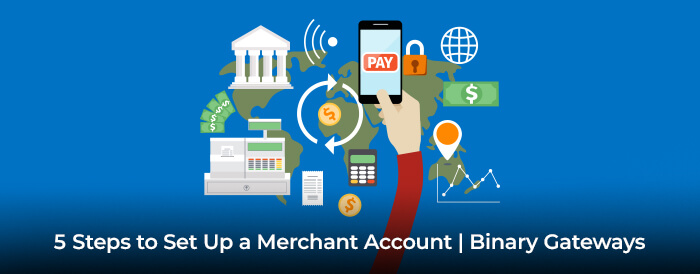5 Steps to Set Up a Merchant Account | Binary Gateways
5 Steps to Set Up a Merchant Account | Binary Gateways

What is a Merchant Account?
Merchant accounts are a type of bank account that allows you to accept credit and debit card payments from your customers.
You can accept debit and credit cards from major brands such as Visa, MasterCard, American Express, and Discover by opening a merchant account.
Your merchant account funds your business with the funds from credit card transactions that you accept, less any fees.
In essence, the debit and credit card payments are transferred to your bank account.
Important to understand that a merchant bank account is different from a traditional business account.
How Do Merchant Accounts Work?
A merchant account simply means that your business receives money from customers who make card purchases through it.
A merchant account does not include any other technologies or services that are associated with merchant processing.
These accounts do not allow you to access transaction proceeds immediately.
You don’t have to wait for credit card transaction proceeds with a merchant account.
This eliminates any delay between the time your customer pays for your product or service using a credit card and when they pay their credit card bills.
We can help you understand the process of taking credit card payments, and how your merchant account functions.
- Customers pay with their credit cards to purchase your products or services. The card processor then sends details to your merchant account.
- The transaction details are sent by your merchant account provider to the card issuer through the card processor.
- Once the customer’s card issuer has confirmed that sufficient funds are available, they contact the processor. The processor then contacts the merchant account to approve the transaction. This is known as interchange. Credit card networks such as Mastercard and Visa oversee this data exchange. We have provided a guide to interchange fees.
- Your merchant account will begin to fund your business with the proceeds from the card transaction, less any fees, to your business bank account.
Let’s now take a look at the steps required to open a merchant services account with a provider of merchant services.
Click Here To Visit More Blogs
- Bad Credit Merchant Account | Binary Gateways
- Restaurant Merchant Services Provider | Binary Gateways
- Firearm Merchant Account | Binary Gateways
- High Risk Vape & E-cigarette Merchant Account
How to Set Up a Merchant Account
1. Obtain Your Business License
First, register your business.
You will need a business license depending on the industry you are in to open a merchant service account.
The state decides which licenses are required, so make sure you look into the details.
This can be done online through the website of your Secretary of State. Follow these steps to register your company.
A business plan and a bank account are required to obtain a license.
Underwriters will review your documents and financial statements when you apply for a merchant account.
2. Know What Kind of Merchant Services You Need
Signing up for merchant accounts is only half the battle. You need to know what type of merchant services your business requires.
Merchant account services are designed to allow you to accept debit and credit card payments. This will ensure that you don’t have to rely on cash transactions.
These will help you provide better customer service and save your company money.
- In-person payments: Brick-and-mortar stores typically choose a conventional point-of-sale (POS) terminal. POS terminals connect with your merchant software to make payments.
- Mobile payments: You can use mobile payment processing options to set up your business’ mobile infrastructure. Modern card readers can be wirelessly turned into virtual terminals to accept card payments from anywhere.
- Online payments: Choose a merchant account provider that offers an online payment gateway if you are an online business. This allows online businesses to accept payments via the internet and have them transferred directly into their bank accounts through their merchant service provider.
![]()
Email us anytime!
Email customer service 24/7 at info@binarygateways.com
![]()
Call us anytime!
Reach customer care 24/7 at (801) 761-5001
3. Set Up Your Business Bank Account
You need to open a bank account for your business before you can open a merchant service account.
A business bank account is a checking account that’s specific to businesses with multiple owners and set up by a financially backed institution.
A personal bank account can be used as a sole proprietor.
Before making a decision, compare the advantages of different financial institutions. Once you’ve made your decision, follow the steps to apply.
Before you go to a branch, contact them for the necessary documentation.
You will need your business license and the Employer Identification Number, (EIN).
For transactions and debits, your merchant services account will be used to access your business bank account.
4. Merchant Account Costs
Each business must account for the various fees associated with its merchant account.
These fees include:
- Setup fee
- Processing fees for credit cards
- Equipment Fee
- Statement Fee
- Early Termination Fees
- Transaction fee
- Monthly Maintenance Fee
Merchant account providers typically charge transaction fees as the largest portion of their fees.
Providers take a cut of every sale and a small transaction fee.
This payment arrangement works well for small businesses that have low credit card transaction volumes. However, it can be expensive for merchants with high volumes.
It is important to remember that although all credit card processors are based on the same underlying processes and offer similar services, not all of them are equal.
A merchant services provider may charge different fees depending on the services they provide.
It is important to pay attention when comparing the costs of acquiring banks and service providers in order to find the best merchant account, provider.
5. Ensure Your PCI Compliance
PCI Compliance is also something you should consider.
The PCI Data Security Standard (DDS), sets rules and regulations to ensure merchants process customer payments securely.
These guidelines should be followed by your provider.
While you don’t have to be PCI compliant in order to open a merchant services account, it is advisable to do so sooner than later.
Here are some ways to increase the security of customer information
- Protect sensitive information
- Password policies should be strong
- Anti-phishing software is a must
These measures can be taken immediately to prevent security problems in the future.
The Bottom Line
It is important to fully understand the role of a merchant account in your ability to accept credit card payments.
This is how you can choose the credit card processing company that best suits your needs.
Binary Gateways believes that the payment process should be easy for customers and seamless for you.
